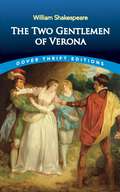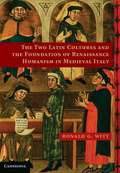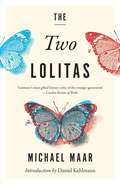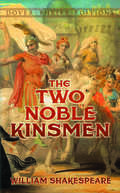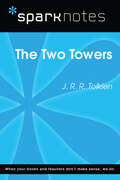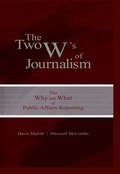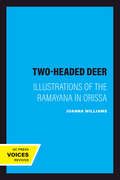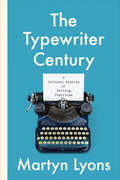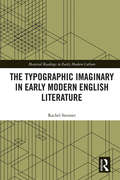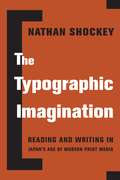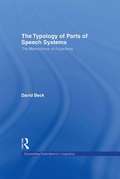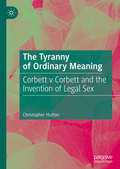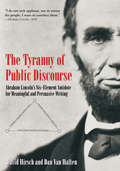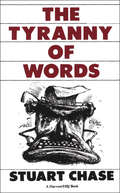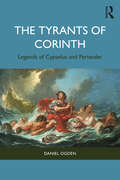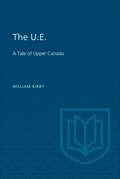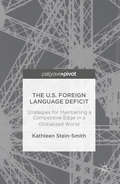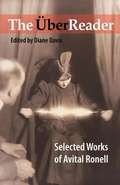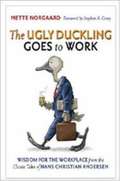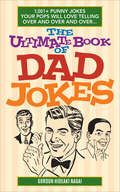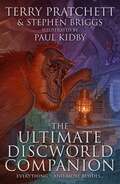- Table View
- List View
The Two Gentlemen of Verona: With The Story Of The Shepherdess Felismena (Dover Thrift Editions)
by William ShakespeareValentine and Proteus are devoted comrades - until they travel to Milan and meet Silvia, the Duke's ravishing daughter. Torn between the bonds of friendship and the lure of romance, the two gentlemen are further bedeviled by Proteus's prior commitment to Julia, his hometown sweetheart, and the Duke's disdain for Valentine. Thus the stage is set for a comic spree involving a daring escape into a forest, capture by outlaws, and the antics of a clown and his dog.Written early in Shakespeare's career, this madcap romp embodies many themes and motifs the playwright would explore at greater depth in his later works. The first of his plays in which the heroine dresses as a boy to seek out her beloved, it's also the first in which the characters retreat to the natural world to brave danger and disorder before achieving harmony, and the first in which passionate youth triumphs over dictatorial elders. And amid its merriment and jests, the play also raises thought-provoking questions about conflicts between friendship and love and the value of forgiveness.
The Two Latin Cultures and the Foundation of Renaissance Humanism in Medieval Italy
by Ronald G. WittThis book traces the intellectual life of the Kingdom of Italy, the area in which humanism began in the mid thirteenth century, a century or more before exerting its influence on the rest of Europe. Covering a period of over four and a half centuries, this study offers the first integrated analysis of Latin writings produced in the area, examining not only religious, literary, and legal texts. Ronald G. Witt characterizes the changes reflected in these Latin writings as products of the interaction of thought with economic, political, and religious tendencies in Italian society as well as with intellectual influences coming from abroad. His research ultimately traces the early emergence of humanism in northern Italy in the mid thirteenth century to the precocious development of a lay intelligentsia in the region, whose participation in the culture of Latin writing fostered the beginnings of the intellectual movement which would eventually revolutionize all of Europe.
The Two Lolitas
by Daniel Kehlmann Perry Anderson Michael MaarA leading German scholar reveals his astonishing discovery about Nabokov’s influential novelDoes it ring a bell? The first-person narrator, a cultivated man of middle age, looks back on the story of an amour fou. It all starts when, traveling abroad, he takes a room as a lodger. The moment he sees the daughter of the house, he is lost. She is a pre-teen, whose charms instantly enslave him. Heedless of her age, he becomes intimate with her. In the end she dies, and the narrator marked by her forever remains alone. The name of the girl supplies the title of the story: Lolita. We know the girl and her story, and we know the title. But the author was Heinz von Eschwege, whose tale of Lolita appeared in 1916 under the pseudonym Heinz von Lichberg, forty years before Nabokov’s celebrated novel took the world by storm. Von Lichberg later became a prominent journalist in the Nazi era, and his youthful work faded from view. The Two Lolitas uncovers a remarkable series of parallels between the two works and their authors—too many to make coincidence the most likely explanation. How did Vladimir Nabokov know of von Lichberg’s long out-of-print tale? And why might he, the grand master of reference, want to draw our attention to such an unremarkable author? Maar’s extraordinary literary detective story casts new light on the making of one of the most influential works of the twentieth century. This new edition includes a preface by best-selling German novelist Daniel Kehlmann and an interview with the author, conducted by Kehlmann, in which Maar reveals that since writing the book, he has unveiled what might be the final piece of the puzzle.
The Two Noble Kinsmen (Dover Thrift Editions #No. 169)
by William ShakespeareThe king of Thebes is a tyrant but his young relatives, Palamon and Arcite, defend him anyway. The two noble kinsmen find their loyalty rewarded with imprisonment when they end up on the losing side of a battle with the great hero, Theseus of Athens. From the window of their jail they observe Emilia, the sister-in-law of their conqueror, whose stunning beauty shatters their vow of eternal brotherhood. Now the former friends must find a way to evade their captors and pursue the alluring princess, an undertaking that will conclude with a fight to the death.First published in 1634, this Jacobean tragicomedy features a plot derived from "The Knight's Tale" in Chaucer's Canterbury Tales. The play was originally attributed to both John Fletcher and William Shakespeare; its association with the latter is a longstanding source of controversy that is now generally accepted by scholarly consensus.
The Two Towers (SparkNotes Literature Guide Series)
by SparkNotesThe Two Towers (SparkNotes Literature Guide) by J.R.R. Tolkien Making the reading experience fun! Created by Harvard students for students everywhere, SparkNotes is a new breed of study guide: smarter, better, faster. Geared to what today's students need to know, SparkNotes provides: *Chapter-by-chapter analysis *Explanations of key themes, motifs, and symbols *A review quiz and essay topicsLively and accessible, these guides are perfect for late-night studying and writing papers
The Two W's of Journalism: The Why and What of Public Affairs Reporting (Routledge Communication Series)
by Davis Buzz" Merritt Maxwell E. McCombsIn this timely volume, the authors explore public affairs journalism, a practice that lies at the core of the journalism profession. They go beyond the journalistic instruction for reporting and presenting news to reflect on why journalism works the way it does. Asking current and future journalists the critical questions, "Why do we do it?" and "What are the ways of fulfilling the goals of journalism?" their discussion stimulates the examination of contemporary practice, probing the foundations of public affairs journalism. With its detailed examination of factors influencing current journalistic practice, The Two W's of Journalism complements and expands on the skills and techniques presented in reporting, editing, and news writing textbooks. The perspectives presented here facilitate understanding of the larger role journalism has in society. As such, the volume is an excellent supplemental text for reporting and writing courses, and for introductory courses on journalism. It will also offer valuable insights to practicing journalists.
The Two-Headed Deer: Illustrations of the Ramayana in Orissa (California Studies in the History of Art #34)
by Joanna WilliamsThis title is part of UC Press's Voices Revived program, which commemorates University of California Press’s mission to seek out and cultivate the brightest minds and give them voice, reach, and impact. Drawing on a backlist dating to 1893, Voices Revived makes high-quality, peer-reviewed scholarship accessible once again using print-on-demand technology. This title was originally published in 1996.
The Typewriter Century: A Cultural History of Writing Practices (Studies in Book and Print Culture)
by Martyn LyonsThis book captures the intensity of the relationship between writers and their typewriters from the 1880s, when the machine was first commercialized, to the 1980s, when word-processing superseded it. Drawing on examples from the United States, Britain, Europe, and Australia, The Typewriter Century focuses on "celebrity writers," including Henry James, Jack Kerouac, Agatha Christie, Georges Simenon, and Erle Stanley Gardner, who wrote prolifically and mechanically, developing routines in which typing, handwriting, and dictation were each allotted important functions. The typewriter de-personalized the text; the office typewriter bureaucratized it. At the same time, some authors found a new and disturbing distance between themselves and their compositions while others believed the typewriter facilitated spontaneous and automatic typing. The Typewriter Century provides a cultural history of the typewriter, outlining the ways in which it can be considered an agent of change as well as demonstrating how it influenced all writers, canonical and otherwise.
The Typographic Imaginary in Early Modern English Literature (Material Readings in Early Modern Culture)
by Rachel StennerThe typographic imaginary is an aesthetic linking authors from William Caxton to Alexander Pope, this study centrally contends. Early modern English literature engages imaginatively with printing and this book both characterizes that engagement and proposes the typographic imaginary as a framework for its analysis. Certain texts, Rachel Stenner states, describe the people, places, concerns, and processes of printing in ways that, over time, generate their own figurative authority. The typographic imaginary is posited as a literary phenomenon shared by different writers, a wider cultural understanding of printing, and a critical concept for unpicking the particular imaginative otherness that printing introduced to literature. Authors use the typographic imaginary to interrogate their place in an evolving media environment, to assess the value of the printed text, and to analyse the roles of other text-producing agents. This book treats a broad array of authors and forms: printers’ manuals; William Caxton’s paratexts; the pamphlet dialogues of Robert Copland and Ned Ward; poetic miscellanies; the prose fictions of William Baldwin, George Gascoigne, and Thomas Nashe; the poetry and prose of Edmund Spenser; writings by John Taylor and Alexander Pope. At its broadest, this study contributes to an understanding of how technology changes cultures. Located at the crossroads between literary, material, and book historical research, the particular intervention that this work makes is threefold. In describing the typographic imaginary, it proposes a new framework for analysis of print culture. It aims to focus critical engagement on symbolic representations of material forms. Finally, it describes a lineage of late medieval and early modern authors, stretching from the mid-fifteenth to the mid-eighteenth centuries, that are linked by their engagement of a particular aesthetic.
The Typographic Imagination: Reading and Writing in Japan’s Age of Modern Print Media (Studies of the Weatherhead East Asian Institute, Columbia University)
by Nathan ShockeyIn the early twentieth century, Japan was awash with typographic text and mass-produced print. Over the short span of a few decades, affordable books and magazines became a part of everyday life, and a new generation of writers and thinkers considered how their world could be reconstructed through the circulation of printed language as a mass-market commodity. The Typographic Imagination explores how this commercial print revolution transformed Japan’s media ecology and traces the possibilities and pitfalls of type as a force for radical social change.Nathan Shockey examines the emergence of new forms of reading, writing, and thinking in Japan from the last years of the nineteenth century through the first decades of the twentieth. Charting the relationships among prose, politics, and print capitalism, he considers the meanings and functions of print as a staple commodity and as a ubiquitous and material medium for discourse and thought. Drawing on extensive archival research, The Typographic Imagination brings into conversation a wide array of materials, including bookseller trade circulars, language reform debates, works of experimental fiction, photo gazetteers, socialist periodicals, Esperanto primers, declassified censorship documents, and printing press strike bulletins. Combining the rigorous close analysis of Japanese literary studies with transdisciplinary methodologies from media studies, book history, and intellectual history, The Typographic Imagination presents a multivalent vision of the rise of mass print media and the transformations of modern Japanese literature, language, and culture.
The Typology of Parts of Speech Systems: The Markedness of Adjectives (Outstanding Dissertations in Linguistics)
by David BeckThis book presents rigorous and criterial definitions of the major parts of speech - noun, verb, and adjective - that account both for their syntactic behaviour and for their observed typological variation. Based on an examination of languages from five different groups - Salishan, Cora, Quechua, Totonac, and Hausa - this book argues that parts of speech must be defined by combining the criteria of syntactic markedness, which characterizes lexical classes in terms of unmarked syntactic roles, and semantic prototypicality, which delimits their prototypical meanings. Adjectives are shown to be the marked (and, hence, most variable) class because of their inherent non-iconicity at the semantics/syntax interface. The four-member typology of parts of speech systems (languages with three open classes, those that group adjectives with verbs, those that group adjectives with nouns, and those that conflate all three) current in the literature is easily generated by free recombination of these two criterial features. Closer examination of the data, however, casts doubt on the existence of one of the four possible language-types, the noun-adjective conflating inventory, which is accounted here for by replacing free recombination of semantic and syntactic features with an algorithm for the subdivision of the lexicon that gives primacy to semantics over syntax.
The Tyranny of Ordinary Meaning: Corbett v Corbett and the Invention of Legal Sex
by Christopher HuttonThis book offers an in-depth analysis of the case of Corbett v Corbett, a landmark in terms of law’s engagement with sexual identity, marriage, and transgender rights. The judgement was handed down in 1970, but the decision has shaped decades of debate about the law’s control and recognition of non-normative gender identities. The decision in this case – that the marriage between the Hon. Arthur Corbett and April Ashley was void on the grounds that April Ashley had been born male – has been profoundly influential across the common law world, and came as a dramatic and intolerant intervention in developing discussions about the relationships between medicine, law, questions of sex versus gender, and personal identity. The case raises fundamental questions concerning law in its historical and intellectual context, in particular relating to the centrality of ordinary language for legal interpretation, and this book will be of interest to students and scholars of language and law, legal history, gender and sexuality.
The Tyranny of Public Discourse: Abraham Lincoln’s Six-Element Antidote for Meaningful and Persuasive Writing
by David Hirsch Dan Van HaftenAre you satisfied with the current state of public discourse? The almost unanimous response from people across the nation is a loud and emphatic “No!” The reply is always the same regardless of politics. Today’s public discourse typically starts with a “conclusion” and goes downhill from there. If there are talking heads, argument begins instantly and typically runs in circles. This is a dangerous path for a society that depends upon civility and virtue to survive. The Tyranny of Public Discourse: Abraham Lincoln’s Six-Element Antidote for Meaningful and Persuasive Writing by scholars David Hirsch and Dan Van Haften addresses what is one of the most important issues of our time. This book can teach anyone how to use logic and reason to create persuasive writing. A byproduct of this is the civility that will ensue with an elevated public discourse. The Tyranny of Public Discourse establishes the six elements of a proposition as a verbal form of the scientific method—something Abraham Lincoln knew and used routinely. His logic and reason is so well known that it is quoted today more than 150 years after his death. Learning the six elements and how to use them to discuss any topic at any time is not only fascinating, but fairly easy to understand and implement. This book sets it all out, step-by-step and color coded, from beginning to end. The Tyranny of Public Discourse: Abraham Lincoln’s Six-Element Antidote for Meaningful and Persuasive Writing, complete with 21 diagrams on how to structure your logic, is the book you have been waiting for. The time is short, and the hour is now.
The Tyranny of Words
by Stuart ChaseThe pioneering and still essential text on semantics, urging readers to improve human communication and understanding with precise, concrete language. In 1938, Stuart Chase revolutionized the study of semantics with his classic text, The Tyranny of Words. Decades later, this eminently useful analysis of the way we use words continues to resonate. A contemporary of the economist Thorstein Veblen and the author Upton Sinclair, Chase was a social theorist and writer who despised the imprecision of contemporary communication. Wide-ranging and erudite, this iconic volume was one of the first to condemn the overuse of abstract words and to exhort language users to employ words that make their ideas accurate, complete, and readily understood. &“[A] thoroughly scholarly study of the science of the meaning of words.&” —Kirkus Reviews &“When thinking about words, I think about Stuart Chase&’s The Tyranny of Words. It is one of those books that never lose its message.&” —CounterPunch
The Tyrants of Corinth: Legends of Cypselus and Periander
by Daniel OgdenThe Tyrants of Corinth is the first monograph in English devoted to the archaic tyranny of Corinth and the engaging legends of Cypselus and Periander, which embrace such themes as hidden babies, animal helpers, arbitrary violence, necrophilia and vengeful ghosts.This detailed study of the ancient sources for the Corinthian tyrants analyses the tales associated with them comprehensively from the perspective of folklore and traditional narrative, including the miraculous birth and deliverance of Cypselus, Periander’s consultation of the ghost of his wife, Melissa, at the Acheron Oracle of the Dead and the saving of the bard Arion from the sea by a dolphin. Any lingering notions that the tales retain historical content are dispelled; Ogden’s radical approach considers all the major episodes associated with both men to be entirely fictive. This allows for reinterpretation of individual details in the tales and for the recovery of lost storylines and symbolism lurking beneath the narrative that our ancient sources preserve for us. All the major sources are supplied in new translations in a convenient appendix, and brief consideration is also given to the tales’ modern reception.The Tyrants of Corinth is suitable for scholars working on Greek tyranny, Greek history and mythology more broadly, and folklore, while also speaking accessibly to undergraduates encountering the history of Archaic Greece for the first time.
The U.E.: A Tale of Upper Canada
by William KirbyA long narrative written in rhyming couplets and presented in 12 cantos, The U.E. tells the story of Walwyn and his sons, Ethwald and Eric, who come to Upper Canada from Yorkshire in the late 1820s, and the United Empire Loyalist Ranger John and his sons, Herman, Hendrick, Simcoe, and Hugh. The poem reaches its climax during the rebellions of 1837-38 when Hugh returns from the United States as a leader of a band of Americans intent on helping the rebels in order “to ourselves annex our glorious gains, / The Forest Land and all that it contains!”
The U.S. Foreign Language Deficit
by Kathleen Stein-SmithThis volume explores why Americans are among the least likely in the world to speak another language and how this U. S. foreign language deficit negatively impacts national and economic security, business and career prospects. Stein-Smith exposes how individuals are disadvantaged through their inability to effectively navigate the global workplace and multicultural communities, how their career options are limited by the foreign language deficit, and even how their ability to enjoy travel abroad and cultural pursuits is diminished. Through exploring the impact of the U. S. foreign language deficit, the author speaks to the stakeholders and partners in the campaign for foreign languages, offering guidance on what can and should be done to address it. She examines the next steps needed to develop specific career pathways that will meet the current and future needs of government, business, and industry, and empower foreign language learners through curriculum and career preparation.
The UK ‘at Risk’: A Corpus Approach to Historical Social Change 1785–2009 (Critical Studies in Risk and Uncertainty)
by Jens O. ZinnThis book presents a case study of the proliferation of at risk-language in The Times news coverage from 1785 to 2009, illuminating the changing social experience of risk. Zinn presents an historical examination of the forces which have shaped the language of risk over time, and considers how linguistic developments in recent decades are underpinned by issues such as cultural and structural transformations, the management of infectious and chronic diseases and climate change. He also explores changes in the public sphere, including the production of the news. Based on an interdisciplinary research project which combines linguistic research tools with sociological analysis of the social contexts, the book contributes to a better understanding of how 'at risk' has become a defining feature of the UK in recent decades, and one which permeates all kinds of social domains. This research will be a point of reference for students and scholars engaging with risk studies from various disciplines including sociology, media studies, history and socio-linguistics.
The UberReader: SELECTED WORKS OF AVITAL RONELL
by Avital Ronell Diane Davis"Avital Ronell has put together what must be one of the most remarkable critical oeuvres of our era... Zeugmatically yoking the slang of pop culture with philosophical analysis, forcing the confrontation of high literature and technology or drug culture, Avital Ronell produces sentences that startle, irritate, illuminate. At once hilarious and refractory, her books are like no others."--Jonathan Culler, Diacritics For twenty years Avital Ronell has stood at the forefront of the confrontation between literary study and European philosophy. She has tirelessly investigated the impact of technology on thinking and writing, with groundbreaking work on Heidegger, dependency and drug rhetoric, intelligence and artificial intelligence, and the obsession with testing. Admired for her insights and breadth of field, she has attracted a wide readership by writing with guts, candor, and wit. Coyly alluding to Nietzsche's "gay science," The ÜberReader presents a solid introduction to Avital Ronell's later oeuvre. It includes at least one selection from each of her books, two classic selections from a collection of her early essays (Finitude's Score), previously uncollected interviews and essays, and some of her most powerful published and unpublished talks. An introduction by Diane Davis surveys Ronell's career and the critical response to it thus far. With its combination of brevity and power, this Ronell "primer" will be immensely useful to scholars, students, and teachers throughout the humanities, but particularly to graduate and undergraduate courses in contemporary theory.
The Ugly Duckling Goes to Work: Wisdom for the Workplace from the Classic Tales of Hans Christian Andersen
by Mette NorgaardFrom the book: Are outer demands for more success, more money, and more prestige overwhelming your inner longings? Is your work no longer energizing you? Years of frenetic activity and blind ambition have robbed many people of the joy and fulfillment they once found in their work. The successes they crave and failures they fear have come to define them. But there is hope, and it can be found in a few simple yet timeless stories. The great Danish writer Hans Christian Andersen succinctly illuminated life's challenges in his treasured fairy tales for children and adults. And now, in celebration of H.C. Andersen's 200th birthday, the powerful lessons of these classic folk tales have been ingeniously applied to the complexities of the modern workplace. The Ugly Duckling Goes to Work probes H. C. Andersen's sharp and witty stories for lessons that will inspire you to bring more meaning, more energy, and more joy to your work -- to create a meaningful work life.
The Ultimate Book of Dad Jokes: 1,001+ Punny Jokes Your Pops Will Love Telling Over and Over and Over . . .
by Gordon Hideaki NagaiA MASSIVE COLLECTION OF LAUGHABLE, CHEESY JOKES PERFECT FOR AMUSING DADS WHILE SLIGHTLY EMBARRASSING THE KIDS As groan-inducing as they are hilarious, dad jokes are the punny one-liners and oh-so-clever quips fathers never tire of telling. With this massive collection, no Dad will ever lack new material to make his kids facepalm: • A watermelon and a honeydew wanted to get married right away, but they cantaloupe. • After Humpty Dumpty recovered from his fall, he was just a shell of his former self. • Sign language interpreters have to lean sideways to translate something in italics. • Anyone with a wheat allergy that routinely eats pasta is just a gluten for punishment. • A chord walked into a bar and ordered a drink. The bartender said, &“We don&’t serve minors.&”
The Ultimate Cockney Geezer's Guide to Rhyming Slang
by Geoff TibballsWould you Adam and Eve it? Over a hundred years after it was first heard on the streets of Ye Olde London Towne, Cockney rhyming slang is still going strong, and this book contains the most comprehensive and entertaining guide yet.Presented in an easy-to-read A to Z format, it explains the meaning of hundreds of terms, from old favourites such as apples and pears (stairs) and plates of meat (feet) to the more obscure band of hope (soap) and cuts and scratches (matches) through to modern classics such as Anthea Turner (earner) and Ashley Cole (own goal), as well as providing fascinating background info and curious Cockney facts throughout. Also included are a series of language tests so that readers can brush up on their newfound knowledge on their way to becoming a true Cockney Geezer.All in all, The Ultimate Cockney Geezer's Guide to Rhyming Slang is well worth your bread and honey to have a butcher's.
The Ultimate Collection of Bible Trivia, Puzzles, and Facts
by Thomas NelsonBible Learning Made Fun! Christians often struggle to feel familiar with their Bibles. But learning and understanding facts about Bible history, places, people, events, and even memory verses can be fun and engaging for the whole family.This big collection of games, puzzles, quizzes, and trivia will help you feel comfortable with the whole Bible through fun activities for small groups or individuals.The Ultimate Collection of Bible Trivia, Puzzles, and Facts uses many creative ways to make Bible study entertaining:Hilarious questionsDifferent kinds of quizzesComical illustrationsWord searches and scramblesFunny fill-in-the blank storiesTopics such as angels, famous people, and miraclesCrossword puzzlesand much more…Gaining Bible knowledge is anything but "trivial" when it comes to following God. The activities in this book can be used as small group ice breakers, Bible study games, travel games, or fun individual study--always with the greater purpose of increasing Bible knowledge to know God better.
The Ultimate Discworld Companion
by Terry Pratchett Stephen BriggsThe absolute, comprehensive, from Tiffany Aching to Jack Zweiblumen guide to all things Discworld, fully illustrated by Paul Kidby.The Discworld, as everyone knows, is a flat world balanced on the back of four elephants which, in turn, stand on the shell of the giant star turtle, the Great A'Tuin, as it slowly swims through space.It is also the global publishing phenomenon with sales of over 70 million books worldwide (but who's counting?). There's an awful lot of Discworld to keep track of. But fear not! Help is at hand. For the very first time, everything (and we mean everything) you could possibly want to know has been crammed into one place.If you need a handy guide to locales from Ankh-Morpork to Zemphis . . .If you can't tell your Achmed the Mads from your Jack Zweiblumens . . .If your life depends on distinguishing between the Agatean Empire and the Zoons . . .Look no further. Updated and perfected by Stephen Briggs, the man behind The Ultimate Discworld Companion's predecessor Turtle Recall, this is your ultimate guide to Sir Terry Pratchett's beloved fantasy world.
The Ultimate Discworld Companion
by Terry Pratchett Stephen BriggsThe absolute, comprehensive, from Tiffany Aching to Jack Zweiblumen guide to all things Discworld, fully illustrated by Paul Kidby.The Discworld, as everyone knows, is a flat world balanced on the back of four elephants which, in turn, stand on the shell of the giant star turtle, the Great A'Tuin, as it slowly swims through space.It is also the global publishing phenomenon with sales of over 70 million books worldwide (but who's counting?). There's an awful lot of Discworld to keep track of. But fear not! Help is at hand. For the very first time, everything (and we mean everything) you could possibly want to know has been crammed into one place.If you need a handy guide to locales from Ankh-Morpork to Zemphis . . .If you can't tell your Achmed the Mads from your Jack Zweiblumens . . .If your life depends on distinguishing between the Agatean Empire and the Zoons . . .Look no further. Updated and perfected by Stephen Briggs, the man behind The Ultimate Discworld Companion's predecessor Turtle Recall, this is your ultimate guide to Sir Terry Pratchett's beloved fantasy world.
